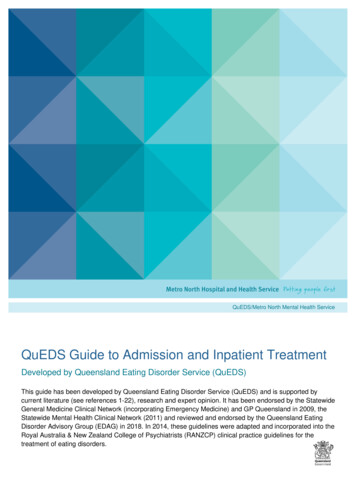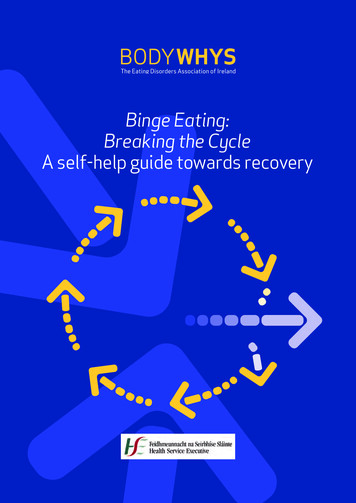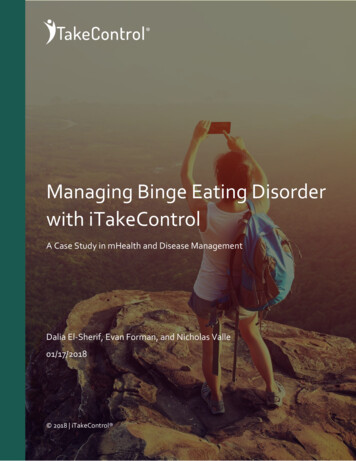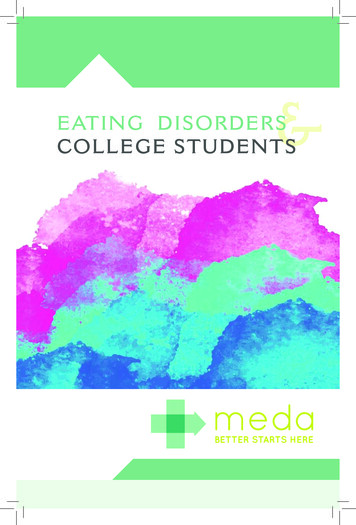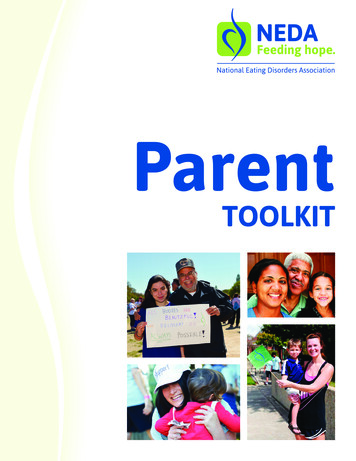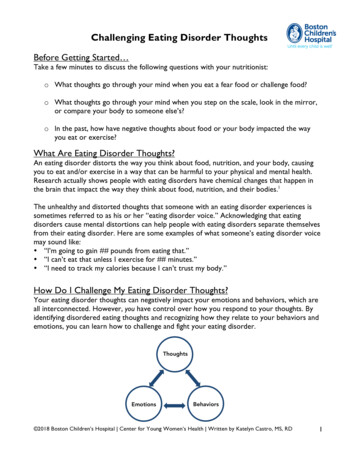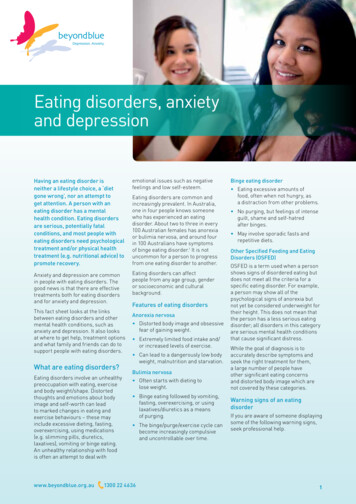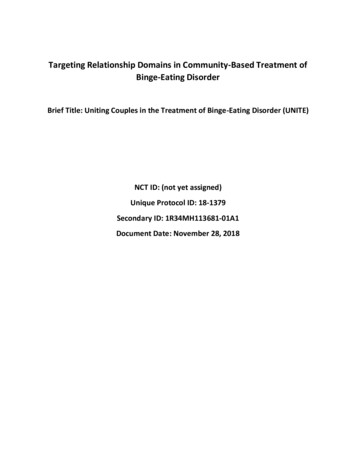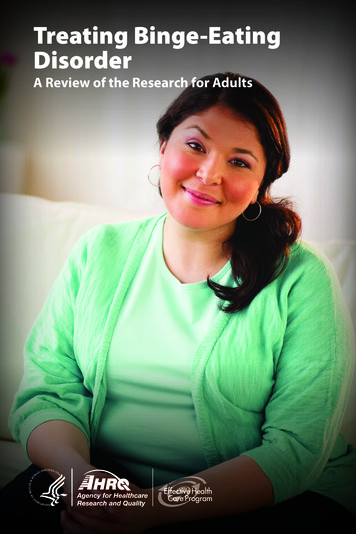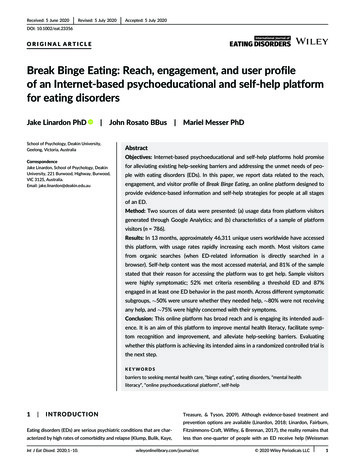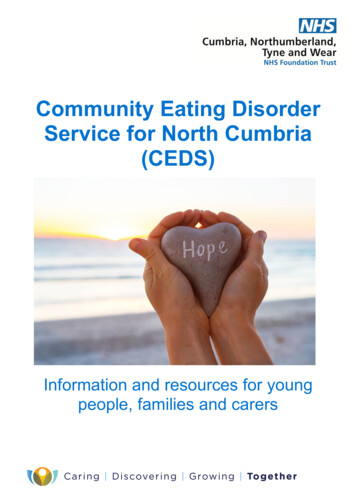
Transcription
Community Eating DisorderService for North Cumbria(CEDS)Information and resources for youngpeople, families and carers
IntroductionThis leaflet provides you with information that you may finduseful about the service. If you are not sure about anything inthis leaflet please ask a member of staff.Our valuesWe believe in working alongside you and your family; offeringcollaborative, compassionate, caring and empathetic qualityoutpatient care. As such, we value your voices and experiencesin both your own care, and the ongoing development of ourservice.What is the Community Eating Disorder Service(CEDS)?CEDS is a multi-disciplinary team, who will be involved in thepatient’s care throughout their time within the service. Teammembers include: Consultant Psychiatrist Clinical Psychologists Specialist Dietitian Specialist CEDS Practitioners Assistant PsychologistPsychiatrists are medically trained doctors. They prescribe andmanage medication throughout the course of treatment.Psychologists and Practitioners use talking therapies to work onyour emotional and mental health through behaviouralinterventions. They can often work closely together throughtreatment.The service provides evidence based therapeutic interventionsand follow the recommendations of the NICE Guidelines forEating Disorders.2
Who is CEDS for?CEDS provide treatment for those struggling with anorexianervosa, bulimia nervosa or binge eating disorder.What does CEDS offer?Treatment with CEDS aims to: Help patients and families gain an understanding of theireating difficulties, Encourage a healthy attitude to food and weight, Promote alternative coping strategies, Enhance self-esteem and confidence, Restore and maintain physical health.Family Therapy for Anorexia Nervosa (FT-AN)FT-AN is an intensive treatment method for children and youngpeople with an eating disorder. This treatment method placesparents/carers at the centre of their child’s recovery by givingthem the responsibility of care. The family is supportedthroughout by CEDS and medical professionals monitoring thechild’s physical health.FT-AN comprises of 4 phases of treatment: Phase 1 is the assessment stage. This phase involvesidentifying the current eating difficulties and working out thebest way forward. Phase 2 is the re-feeding stage. Phase 3 is all about weight maintenance and stabilisation. Inthis stage, the young persons thoughts and behaviours areaddressed once weight is stable. Phase 4 is relapse prevention and ultimately, discharge.3
Patient and parent feedback about the serviceI feel l like I am always takenseriously and the people who workwith me make me feel comfortabletalking about my problems. I feellike I can trust them and not feeljudged. (Patient)Although staff wereprofessional, it felt like wewere visiting a friend for achat so it was comfortablefor a teenager to attend”(Parent)It has shown amazingeffects on me and has mademe feel much betterphysically and mentally.(Patient)We feel very lucky that we have hadthe help from this service. I dread tothink where we would be now if itwasn't for all their help andguidance. (Parent)4I felt that I was treatedas an individual personrather than being givena label. It helped me tounderstand what washappening and why.(Patient)
A letter written by a parent to other parents“Eating disorders thrive on conflict and differences of opinion these situations are inevitable, but a caring, consistent, unitedapproach helps to minimise these episodes (easier said thandone sometimes, but you can’t blame yourself if you have doneyour best!). Try to agree parameters between those assisting atmealtimes before the meal.”“Everyone (friends, family) has their own opinion and level ofunderstanding on how best to handle the eating disorder engaging with the CEDS team, using available resources “SkillsBased Learning for Caring for a Loved One with an eatingdisorder” and trusting your gut instinct all help with this. Onesize doesn’t fit all and there is no manual on how to fix things.”“Try to separate your loved one from the Eating Disorder - thiswill help when you are angry and you discover that the illnessdoes not respond well to logic. The eating disorder does notdefine the sufferer.”“When dealing with an eating disorder, you are on an extremelydifficult journey, with the end result being the best outcome forthe sufferer (and their family/carers). Every day is different and‘tomorrow is always another day’. Draw a line under the day’sstrife and try again. Don’t assess progress daily or weekly - itwill not be linear”“Make time for yourself (wherever you can). It may not feel likeit at times, but your loved one is still in there somewhere anddoes appreciate your support. Remember - you are human, somistakes will happen.”“People do recover/learn how to manage the illness - motivatorsare an essential part of this process.”“Be a good listener when the time is right. Never give up askingif a chat will help - one day the answer will be ‘Yes’.”5
Helpful resources Beating Eating Disorders (BEAT)www.beateatingdisorders.org.uk/Helpline: 0808 801 0677 National Centre for Eating Disorderswww.eating-disorders.org.uk Anorexia and Bulimia Carewww.anorexiabulimiacare.org.ukContact: 03000 11 12 13 Family Lives - Support for familieswww.familylives.org.uk Families Empowered And Supporting Treatment ofEating Disorders (FEAST-ED)www.feast-ed.org/ Anorexia Nervosa: A Survival Guide for Families, Friendsand SufferersJanet Treasure Skills Based Learning for Caring for a Loved One with anEating Disorder: The Maudsley MethodJanet Treasure, Grainne Smith and Anna CraneInterpretersStaff can arrange an interpreter if you need one.6
What if I have a comment, suggestion, compliment orcomplaint about the service?If you want to make a comment, suggestion, compliment orcomplaint you can: Talk to the people directly involved in your care Ask a member of staff for a feedback form, or complete aform on the Trust website www.cntw.nhs.uk (click on the‘Contact Us’ tab) Telephone the Complaints Department Tel: 0191 245 6672 Email complaints@cntw.nhs.uk Please note that informationsent to the Trust via email is sent at your own risk We are always looking at ways to improve services. Yourfeedback allows us to monitor the quality of our services andact upon issues that you bring to our attention.You can provide feedback in the following ways:- the quickest way for you to do this is to complete our shortonline survey at www.cntw.nhs.uk/poy- complete a Points of You survey, available from staff.Contact usCommunity Eating Disorder Service (CEDS)Tel: 01228 603 017The Fairfield CentreCarleton ClinicCumwhinton DriveCarlisleCA1 3SX7
Further information about the content, reference sources orproduction of this leaflet can be obtained from the PatientInformation Centre. If you would like to tell us what you thinkabout this leaflet please get in touch.This information can be made available in a range of formats onrequest (eg Braille, audio, larger print, easy read, BSL or otherlanguages). Please contact the Patient Information CentreTel: 0191 246 7288Published by the Patient Information Centre2020 Copyright, Cumbria, Northumberland, Tyne and WearNHS Foundation TrustRef, PIC/818/0220 February 2020 V1www.cntw.nhs.ukTel: 0191 246 7288Review date 2023CNTWNHS@cntwnhs8
"Try to separate your loved one from the Eating Disorder - this will help when you are angry and you discover that the illness does not respond well to logic. The eating disorder does not define the sufferer." "When dealing with an eating disorder, you are on an extremely difficult journey, with the end result being the best outcome for
